Fresh Faces in the Rectorate
Freiburg, Apr 07, 2021
The administration of the University of Freiburg is set and ready to work. Five new people have joined the Rectorate who will set the university’s future course in research and innovation, academic affairs, internationalization and sustainability, scientific communication and strategy, and higher educational culture. What drives them in their work? What attractions do they see in the University of Freiburg, and what are their goals for the coming years?
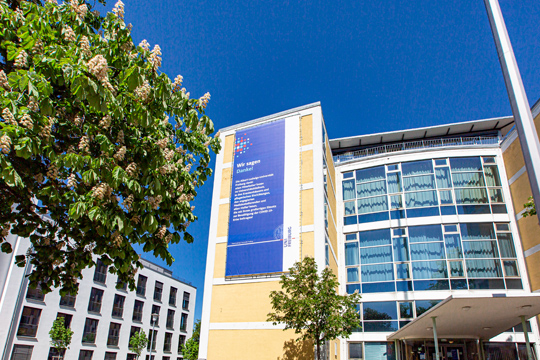
Five new faces round out the Rectorate on Fahnenbergplatz. Photo: Sandra Meyndt
Prof. Dr. Daniela Kleinschmit became part-time Vice President for Internationalization and Sustainability on April 1, 2021.
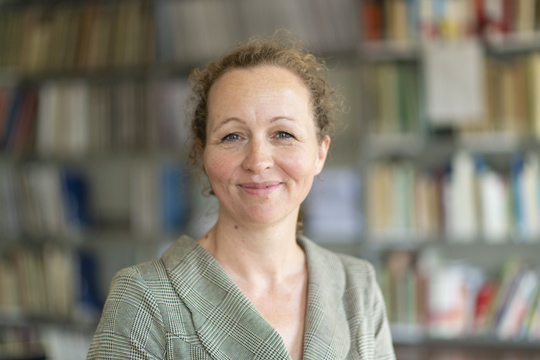
Photo: Patrick Seeger
Ms. Kleinschmit, you were previously primarily involved in teaching and research. What made you change your position?
Daniela Kleinschmit: Working as a part-time vice president isn’t really a change in position. Instead, it’s an expansion of an area of responsibility. I've been a professor for forest and environmental policy at the University of Freiburg for more than six years, and as always, I view what I do for work as exciting and fantastic. Beyond that, I enjoy taking part in shaping the context in which I work as well. Rather than looking in from the outside and commenting and criticizing, I’d like to try to contribute my ideas. Of course that only works when they’re issues that are really close to one’s heart. And for me, sustainability and internationalization are, in any case.
What are three aims you would like to achieve in the coming years?
First, setting a comprehensive sustainability agenda for the University of Freiburg, to which the areas of research, teaching, and university operations contribute conceptually. Second, an approach to internationalization with a strategic focus and orientation on existing and new partnerships. And improved internal and external university communication on the issues of internationalization and sustainability.
What makes the University of Freiburg attractive for you?
The University of Freiburg is a comprehensive university with a broad spectrum of disciplines that includes the full range of areas – from basic to applied research. That means there are always exciting, new topics to discover. Although it is very traditional and time-honored, the University of Freiburg is a place of critical, considered thought. That’s a very good starting point for a transformation to greater sustainability. The university is located in a city that is internationally-known within the field of sustainability. That, taken together with its well-anchored position in the tri-country area, which includes long experience with partner institutions on the Upper Rhine, offers a stimulating framework for an open and internationally oriented university.
You came into office during the pandemic. What are you looking forward to when the corona crisis is over?
At the start, it's vital to gain an overview. Right now, that's only possible through online meetings. Yet for me, meeting people personally as well is part of establishing full understanding. To see where and how they work, and get to know them through informal chats, rather than just disappearing right after the meeting or switching off the camera during the break. That’s the way to get a better sense of the atmosphere. The issues that aren’t quite so formal, or listed on an agenda, but nevertheless contribute to making goals achievable, simply don’t get enough attention during digital communication. So I’m looking forward to meeting lots of people personally at the university, in the city of Freiburg, and at our partner institutions.
Prof. Dr. Michael Schwarze, designated Vice President for Academic Affairs
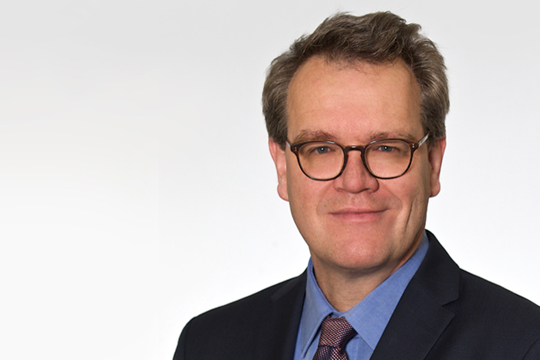
Photo: University of Konstanz
Mr. Schwarze, you formerly worked mainly in research and teaching. What made you change jobs?
For nearly 30 years, as a Romance Studies specialist I dedicated myself intensively to research and teaching, yet I also routinely got involved in academic self-administration again and again, most recently for four years as the dean of the Faculty of Humanities at the University of Konstanz. A big attraction of the new office at the University of Freiburg is for me now to play a leading role with complete concentration dedicated to furthering the development of a comprehensive university. Curiosity about working in these fields as well as academic teaching and learning cultures are among the primary drivers of this desire.
What are three objectives you would like to achieve in the coming years?
The first and most important task of the vice president for academic affairs has to be the continual improvement of the conditions of study and furthering the offering in terms of courses of study and learning formats. In order to reach this goal, the first thing that needs doing is to identify common aims with all those involved and define the conditions under which these aims can be achieved.
A second objective is to implement study for our students in a way that more strongly approaches future-oriented lines of inquiry that concern the whole of society. Among these are, for example, topics such as sustainability, digitization and diversity, but also the internationalization of study offerings, diligent compliance with good academic practice in teaching, or the reciprocal transfer of knowledge and skills to and from society.
My third goal is to conceive of and shape academic affairs in connection with the other pillars of the university to ensure this area can make a key contribution to the success of the University of Freiburg in the next excellence competition.
What makes the University of Freiburg attractive for you?
For one thing, I find extremely fascinating the fundamental tension between the historically-developed traditions of a time-honored comprehensive university and the constant demands of modern innovation. Another of the university’s trump cards is in its strategically favorable regional and international integration, which holds a great deal of stimulating potential for innovation and makes structurally robust cooperation in learning and teaching possible. After all, in my view, the University of Freiburg is part of a very attractive cultural landscape.
You came into office during the pandemic. What are you looking forward to when the corona crisis is over?
I’m happily anticipating meeting many people personally and taking part in activities with the members of the university community who fill projects with life. The same is true for the renewal of work contacts abroad, which are really suffering at the moment. And for me, personally, the opportunity finally to experience art and culture live and at venues will contribute very significantly to regaining a desirable quality of life.
Julia Wandt has been working in the business unit Communications and Strategy since February 1, 2021.
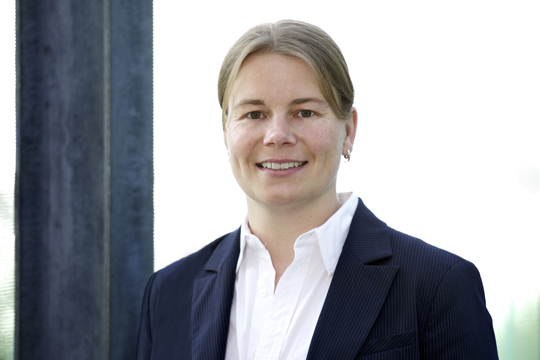
Photo: University of Konstanz
Ms. Wandt, you used to work mainly in communications. What made you change your position?
The opportunity for the first time to take part in shaping academic and research communications at the administrative level at a university in Germany as well as being able to cooperate so closely in conceiving the university’s strategy, and that all based on my 20 years of experience in academic and scientific communications and strategy development for the area of research.
What are three aims you would like to achieve in the coming years?
Three significant, initial aims of my work will have been achieved, if by mid-2022 …
... a full package of strategy development, types of support, and topical inclusion of all those interested as well as open and transparent communication for the coming excellence strategy round of applications have been worked out. These must present the performance capabilities of the university as the best possible basis and condition for taking part in the competition.
... a culture and types of trusting and close cooperation have been established at the university via which all those responsible and science communication professionals can contribute to strategy development, regardless of the part of the university where they are active. For me, this is a requirement for genuine synergies emerging between academic and research communications and university strategy as a whole – and that the university will produce nationally leading scientific communication not just as performance and assessment criteria per se (which it will increasingly become), but rather that we – through this cooperation together make the university nationally and internationally more visible in areas the institution itself has defined as strategically relevant image fields.
... most of the university community is of the opinion that trust and the significance that scientific communication has been given through its being placed rectorate, coupled with its close synergies with strategy development at the university, are well-placed.
What makes the University of Freiburg attractive for you?
Everything that was mentioned in the first two answers means it offers an ideal foundation and that members of the university community are not just open to this, but would like to actively take part in developing it.
You came into office during the pandemic. What are you looking forward to when the corona crisis is over?
Being able to sit with my colleagues outside one of the restaurants or bars in town in fine weather after work.
Prof. Dr. Stefan Rensing is the designated Vice President for Research and Innovation.
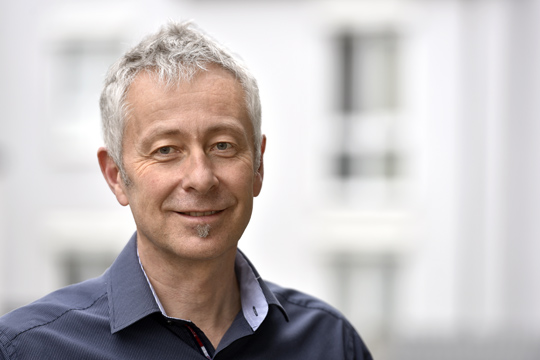
Photo: Thomas Kunz
Mr. Rensing, you formerly worked in research and teaching. What made you change your position?
Once a year I go on a “Lab Retreat” with my working group and we have intensive conversations, during which the issue of career goals comes up, too. In 2020, I determined that I achieved all the objectives I’d set for myself at the start of my career as a group leader. So it was time for something new, and because I’ve always been interested in organization and management, this seemed like the right step.
What are three aims you would like to achieve in the coming years?
I’d like to increase the visibility of the excellent research being done in Freiburg. At the same time, I’d like to ensure the knowledge generated at the University of Freiburg will be publicized and communicated in an even freer, more transparent, and reusable way. Another aim would be improving digital participation in scientific conferences.
What makes the University of Freiburg attractive for you?
The University of Freiburg has an enormous spectrum of cultures and disciplines and is a rich treasure trove of knowledge.
You came into office during the pandemic. What are you looking forward to when the corona crisis is over?
Being able to go to restaurants and pubs easily, and just maintaining personal contacts in general beyond a screen.
Prof. Dr. Sylvia Paletschek has been part-time Vice President for University Culture since April 1, 2021.
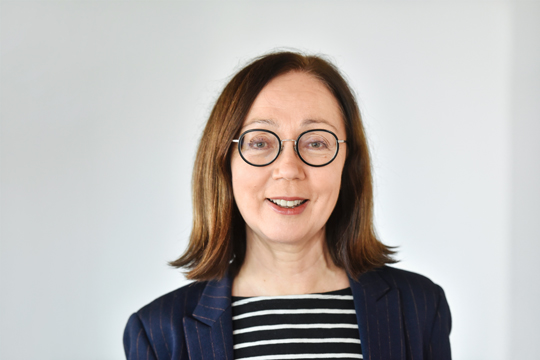
Photo: Thomas Kunz
Ms. Paletschek, until recently you worked in research and teaching. What made you change your position?
Curiosity about getting to know the university from a different perspective. The joy of taking on new tasks and becoming involved in university issues such as equality and faculty structure, which have long been concerns of mine.
What three aims would you like to achieve in the coming years?
Serenity. Recognizing the things I really want to achieve and implement. To be specific, equality, diversity, and the optimization of career paths at the university, as well as strengthening identification with the university.
What makes the University of Freiburg attractive for you?
Academically outstanding and interesting colleagues and students; interdisciplinary cooperation and the readiness to look outside the box in several respects; and a charming city and surroundings.
You came into office during the pandemic. What are you looking forward to when the corona crisis is over?
Being able to discuss things again with people in a “real” group and being able to work together. Simply sitting in a café, and going swimming.

